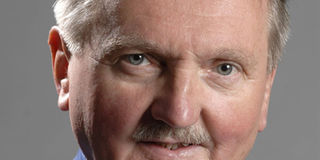German who has twice differed with other ICC judges

Judge Hans-Peter Kaul has twice differed with his two colleagues at the ICC Pre-Trial chamber in his ruling on the Kenyan case. Photo/FILE
The German jurist can now be easily described as the dissenting judge in Kenya’s post-election violence case.
Judge Hans-Peter Kaul has twice differed with his two colleagues at the ICC Pre-Trial chamber in his ruling on the case.
Once again, the judge dissented in the ruling summoning the six post-poll chaos suspects to The Hague.
His colleagues, Ekaterina Trendafilova and Cuno Tarfusser agreed with ICC prosecutor Luis Moreno-Ocampo’s arguments that there was reasonable evidence that the suspects played a key role in the post-election violence.
Judge Kaul is expected to release his dissenting opinion, which would most certainly be keenly read by defence attorneys.
His first dissenting opinion on whether the Kenyan cases met the threshold of the ICC admission attracted considerable analysis in the legal fraternity and media.
Notably, Mr Kaul is the seniormost of the three-judge bench, and the second vice-president of the ICC.
In his first ruling, the German said there was no evidence to show crimes against humanity were committed in Kenya, an opinion that raised the hopes of the suspects and emboldened Mr Moreno-Ocampo’s critics.
His was the dissenting decision when Mr Moreno-Ocampo was given the green light to investigate the post-election violence. (Read: Who is this ICC judge who dissented on Kenya?)
The 67-year-old judge argued that claims that the violence was organised were not supported by any of the material presented before the judges.
“While I accept that some of the violence appears to have been organised and planned in advance, I fail to see the existence of an “organisation” behind the violent acts which may have established a policy to attack the civilian population within the meaning of article 7(2)(a) of the Statute.”
The judge also indicated that he had not found any information, including the victims’ representations, suggesting a State policy on attacking civilians.
In his view, politicians’ hiring of criminal gangs was an indicator of a partnership of convenience for a passing occasion rather than an “organisation” established for a purpose. He also exonerated security agencies, saying police helped to coordinate humanitarian responses.
A statement on the ICC website describes the judge as an international law scholar with a wealth of experience in diplomacy.
Before his appointment, he served as consul at the German embassy in Norway, as political counsellor to the US, and as head of International Law in Germany’s Foreign ministry.
He has seven years experience working as a judge at the court, having been appointed in March 2003. He is among judges handling the case of former DRC Vice-President Jean Pierre Bemba Gombo.
As head of the German delegation, he took part in the discussions and negotiation process of the Rome Statute that created the ICC.
And of the other two, Italian judge Tarfusser was appointed along with Kenya’s Justice Joyce Aluoch on March 11, 2009 for a term of nine years.
Born in 1954, Tarfusser has served the Public Prosecution Office of the Bolzano District Court, Italy, as deputy Public Prosecutor for 16 years and as Chief Public Prosecutor for eight years.
Under his guidance, the workings of the office were radically restructured, the organisational model which is now considered as the standard for the entire justice administration system throughout Italy.
His involvement as public prosecutor includes a number of investigations and trials encompassing crimes against individuals; crimes against the state, including terrorism; crimes against public administration such as extortion and corruption, among others.
He has lectured at a number of university law faculties in Italy.
Bulgarian judge Trendafilov was appointed as an International Criminal Court judge on March 11, 2003, for a term of nine years. Born in 1953, the judge has extensive experience in criminal law, criminal procedural law and international criminal law.
She has been professor of Criminal Justice at Sofia University since completing her PhD in 1984.
She chaired the working group that prepared the reform of the Bulgarian criminal procedure in line with the European and international standards.




